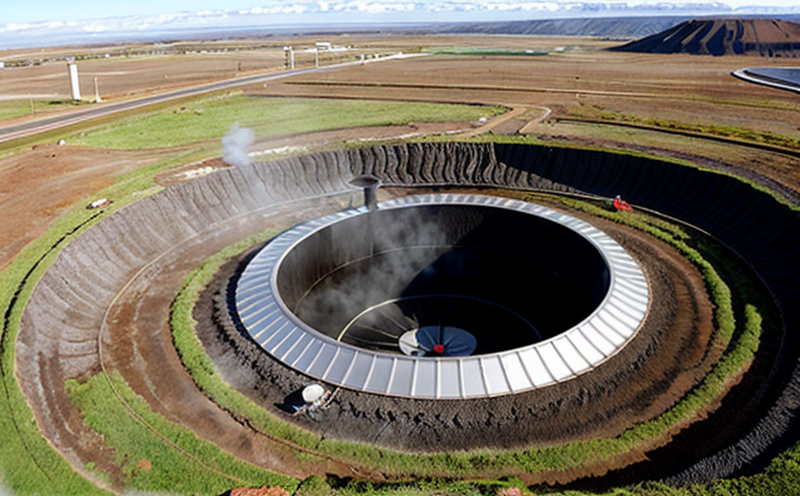ISO 17616 Environmental Impact Testing of Geothermal Systems
The ISO 17616 standard is pivotal for the comprehensive evaluation and quantification of the environmental impact associated with geothermal systems. This service ensures that geothermal energy installations are not only efficient but also sustainable, aligning with global sustainability goals.
Geothermal energy harnesses heat from the Earth's interior to generate electricity or provide direct heating. The environmental footprint of these systems is critical for their long-term viability and acceptance by regulatory bodies and the public. ISO 17616 provides a structured approach to measure, monitor, and mitigate this impact.
The testing process involves several stages that are crucial for understanding the environmental effects. First, it requires the identification and quantification of emissions such as CO2, CH4, N2O, SOx, NOx, and particulate matter. These pollutants can have significant impacts on air quality and climate change.
Secondly, noise levels and vibrations are assessed to ensure they do not exceed safe thresholds for both human health and wildlife. The standard emphasizes the importance of minimizing these effects to preserve ecosystems around geothermal plants.
The third aspect focuses on the analysis of water usage and discharge. Geothermal systems can have substantial impacts on local water resources, which is why this aspect of testing is crucial. Proper management of water intake and effluent is essential for sustainable operations.
Finally, the service evaluates land use changes resulting from geothermal activities. This includes assessing soil quality, vegetation cover, and biodiversity before and after installation to ensure that minimal environmental disruption occurs during project execution.
The testing process involves rigorous sample collection and analysis methods. Specimens are collected from various stages of system operation and analyzed using advanced laboratory equipment. The use of international standards such as ISO 17616 ensures consistency and reliability in the results obtained.
Upon completion, a detailed report is generated that outlines all findings and recommendations for improvement where necessary. This document serves as an invaluable tool for stakeholders involved in geothermal projects, helping them make informed decisions about sustainability practices.
The benefits of adhering to ISO 17616 extend beyond mere compliance; they contribute significantly towards building trust among local communities and enhancing corporate reputation. By demonstrating commitment to environmental responsibility, organizations can foster positive relationships with all relevant parties involved in the project lifecycle.
Compliance with this standard also opens up opportunities for obtaining certifications that validate a company's dedication to sustainable practices. Such recognition can be particularly valuable when seeking funding from environmentally conscious investors or participating in tenders where stringent criteria are set by buyers.
Benefits
The implementation of ISO 17616 Environmental Impact Testing offers numerous advantages that extend across multiple dimensions:
- Enhanced Sustainability: By identifying and mitigating negative environmental impacts, organizations can significantly reduce their carbon footprint.
- Better Decision-Making: Detailed reports provide insights into specific areas where improvements are needed, enabling more informed decision-making processes.
- Improved Reputation: Demonstrating a proactive approach towards sustainability enhances an organization's image and reputation within the industry and beyond.
- Achieving Compliance: Ensuring adherence to international standards helps avoid potential legal issues and penalties associated with non-compliance.
In summary, ISO 17616 is not just about meeting regulatory requirements; it's a proactive step towards fostering environmental stewardship and promoting sustainable practices within the geothermal sector.
Customer Impact and Satisfaction
- Enhanced Stakeholder Relations: By reducing negative impacts on local environments, companies can build stronger relationships with communities surrounding their operations.
- Increased Market Share: Demonstrating a commitment to sustainability through ISO 17616 compliance can attract environmentally conscious consumers and investors.
- Improved Operational Efficiency: Early detection of potential issues allows for preventive measures, reducing downtime and operational costs.
The service ensures that customers receive accurate, reliable data which guides them in making well-informed choices regarding their geothermal energy projects. This transparency fosters trust and satisfaction among all parties involved.
Use Cases and Application Examples
- New Project Development: Early-stage evaluation helps in designing more environmentally friendly projects from the ground up.
- Existing Plant Optimization: Regular testing ensures optimal performance and identifies areas for improvement continuously.
- Regulatory Compliance: Ensures ongoing adherence to environmental regulations, avoiding costly penalties and sanctions.
These use cases underscore the versatility of ISO 17616 Environmental Impact Testing in addressing diverse needs within the geothermal sector. By leveraging this service, companies can ensure they are meeting global standards while enhancing their operational efficiency and sustainability efforts.





